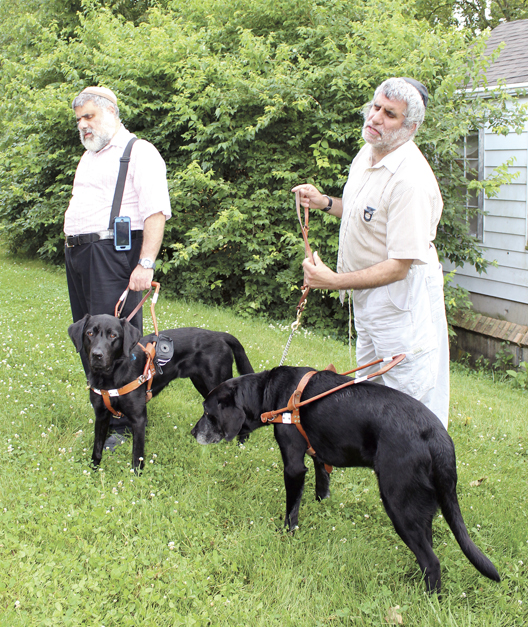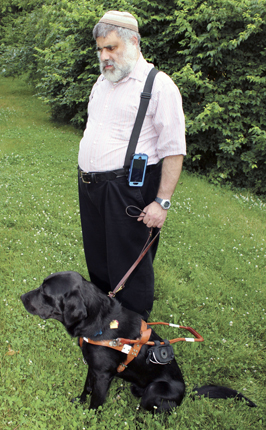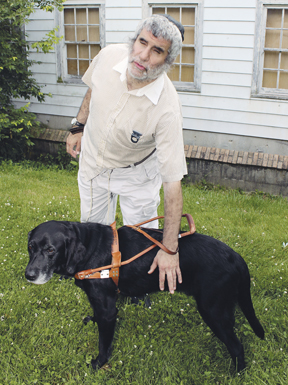Navigating Judaism to find independence

By Martha Moody Jacobs, Special To The Dayton Jewish Observer
Moshe and Chaim Segal, brothers with visual impairments often spotted in the Kettering-Oakwood area, have celebrated milestones over the past few months. Moshe was recently paired with his first guide dog, Orion; and Chaim published the first volume of his planned five-volume memoir, The Sayzeh Song. The two milestones encapsulate the unique relationship between each brother and his Jewish upbringing.
I met with Moshe and Chaim at Sinclair Community College, where Chaim works at a call center helping inbound students. We sat around a table, with Orion, and Chaim’s guide dog, Yahtzee (Chaim has had a guide dog for years), resting at their feet. Moshe and Chaim aren’t totally blind; each can distinguish some light and dark.
The brothers grew up in an Orthodox home in Dayton, and attended the now defunct Congregation Shomrei Emunah/Young Israel of Dayton with their parents and two sighted brothers. Keeping mitzvot (commandments) remains important to them.
Moshe, 48, regularly attends prayer minyans for yahrzeits and shivas. Chaim, 46, dons tefillin every morning, and has delivered kosher food to sick friends. Both sing and play keyboards — they were members of the Beth Abraham Synagogue Youth Chorale — and have provided music at simchas. They walk to Shabbat services at Chabad in Oakwood each Saturday.

Moshe’s decision to acquire a guide dog was precipitated by a recent rabbinic ruling that his use of a white cane on Shabbat was forbidden without an eruv.
An eruv is a ritual enclosure, often marked by wires, that allows Jews to carry certain objects outside their homes on Shabbat, in accordance with halachah (Jewish law).
The Oakwood area doesn’t have an eruv, and Moshe’s rabbinic authority, Rabbi Dovid Feinstein of New York, said it would violate halachah for Moshe to continue carrying a cane on Shabbat. In order to go to services independently, Moshe needed a guide dog.
“At a very early age,” Moshe explains, “I decided that I believe in the things I was taught by my religious teachers, including that God expects us to do all these things.”
Orion has been taught to lead Moshe around obstacles and traffic. Moshe spent three weeks training with Orion at The Seeing Eye, a philanthropic organization in Morristown, N.J. The Seeing Eye breeds, raises and trains puppies to become guide dogs for those with visual impairments. It provides clients with guide dogs and training at prices within their reach.
It is Orion’s training in “intelligent disobedience,” Moshe notes with no trace of irony, that helps keep him safe.
While Moshe derives satisfaction from following halachah, Chaim’s relationship to Orthodox Jewish practice is more ambiguous. Chaim has a “rather liberal political viewpoint” and has problems with “certain aspects of how men’s and women’s roles are viewed within Orthodoxy.”
“I kept thinking that when I got older I would understand things better,” Chaim says. “Originally, what kept me going was the fear that if I forsook the commandments, I would place the entire nation (the Jewish people) in mortal danger. For me, this is a very complicated subject.” And one that his memoir, The Sayzeh Song, explores.
Chaim’s memoir presents a childhood filled with confusion and isolation. The title, The Sayzeh Song, comes from Chaim’s misunderstanding of the chorus of the Hall and Oates song, Say It Isn’t So. Chaim heard the words “Say it!” as a weird voice calling out an incomprehensible “Sayzeh!” on a “frightening-sounding chord.”
Only later did he learn the real, more positive meaning of the phrase.
In a similar vein, Chaim recounts several stories in his memoir of his father’s harshness and impatience.
“He had a blind mother, so maybe…” Moshe starts, trailing off.
In his book, Chaim also recounts his father’s own difficult childhood (there was “absolutely no room for objection” in his father’s childhood home) and thanks his father, a psychologist who died in 2004, for “teaching me to be an ethically moral person.”
Their mother, who now lives in a senior-care facility, promoted her sons’ learning and self-reliance. The brothers started reading Braille at age 5.
Moshe was educated through high school at Hillel Academy, and, after a rocky start in public school, Chaim graduated from Colonel White High School.
Both brothers attended college and, for a time, Moshe studied to be a rabbi. Now, the men have the latest electronic devices that let them read, type, and transcribe in Braille.
Although they live near each other, the brothers have separate dwellings and lead separate lives. They take turns hosting Shabbat dinners. They’re proud of their independence.
Moshe feels as if he is “losing credit” when people jump in to give him help he doesn’t need. “We’re not a tzedakah box,” he says of himself and Chaim.
Moshe, who used to work at a call center, is frustrated that he isn’t employed now. He cites employers’ irrational fears about hiring a blind person, and notes that the highest form of tzedakah (righteous giving) is giving someone a job.
He admits that an Orthodox life with time off for Shabbat and Jewish holidays can lead to scheduling issues in the workplace. His dream job would be with computers. Chaim notes eagerly that his brother has an uncanny ability to solve computer problems and get users out of serious jams.
Each brother is married to a woman he appreciates as a blessing. Marriage is not a given in the blind community, and, as Chaim notes, the Orthodox community offers limited options for blind people to make the social connections needed for marriage.

Chaim’s experience in the Orthodox matchmaking world was filled with disappointments; he came to believe that his blindness made him unmatchable.
In 2004 at Chabad, Moshe married Hadar, a Jew by choice who is also visually impaired; he met her through mutual friends.
Chaim, encouraged by Moshe and especially Hadar to “go out of his way” to date a blind woman, joined a Harry Potter chat room on a voicemail system for the blind.
There, he met “somebody very special,” the woman living in Florida who would become his wife. Hava, legally Brooke, is not Jewish, although she was intrigued by the faith and had actually prayed for God to send her a man named Chaim.
Over time, Chaim’s mother accepted Hava, realizing that Hava had no desire to change Chaim’s level of religious observance.
In 2009, Chaim and Hava were married by Reform Rabbi David Burstein, then with Temple Beth Or. The marriage is a happy one, although Chaim notes that many in his Orthodox world refuse to call his wife Hava, “feeling that she has no right to a Hebrew name until she converts, if she ever does.”
Despite these challenges to his marriage, Chaim continues to attend Orthodox services and dons his tefillin daily. Because guide dogs are unusual in Orthodox synagogues, he and Moshe express their thanks that Chabad’s Rabbi Nochum Mangel has set aside an area for them to sit with their dogs.
Orthodox Jews, Chaim says, tend to have more of a fear of dogs than the general population. And because they have little contact with dogs as pets, that fear can sometimes manifest itself when guide dogs are in their presence.
The antidote, he says, is to educate people more about the needs of those with disabilities. Not only are guide dogs invaluable helpers, Chaim says they provide their owners with comfort and love in times of loneliness.
Chaim continues to work on his memoir and dream big — an activity, he says, that blind people are not often encouraged to do — about “blind Orthodox conventions and Shabbatons.”
When I ask Chaim what keeps him going as an Orthodox Jew, he responds with a question for me as a Reform Jew: “When so many basic tenets of Judaism, i.e. observance of kashrut and Shabbos, are withheld, how does a movement keep its strength?”
To read the complete July 2017 Dayton Jewish Observer, click here.

